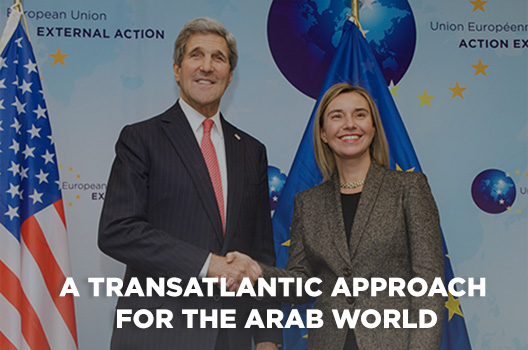 The roar of euphoria and promise that arose from the 2011 Arab awakening not more than four years ago now seem but a distant whisper in the wake of regional turmoil and international security concerns plaguing the once-transitioning countries of North Africa and the Middle East. Save for Tunisia, every Arab country that shed a dictatorship faces either civil war or a retreat into authoritarianism. Promises of assistance from the European Union and United States to support the democratic transitions of the region gave way in the face of their own domestic concerns and core security goals. In doing so, the United States and European Union (EU) have returned to the pre-2011 norm of belaying the focus on democracy and governance in the Arab world in favor of security partnerships to combat the imminent threat of terrorism and a nuclear Iran. Why did the transatlantic partnership to support democracy and economic reform in the region hit a brick wall? Where did we go wrong? And is there a chance to correct course?
The roar of euphoria and promise that arose from the 2011 Arab awakening not more than four years ago now seem but a distant whisper in the wake of regional turmoil and international security concerns plaguing the once-transitioning countries of North Africa and the Middle East. Save for Tunisia, every Arab country that shed a dictatorship faces either civil war or a retreat into authoritarianism. Promises of assistance from the European Union and United States to support the democratic transitions of the region gave way in the face of their own domestic concerns and core security goals. In doing so, the United States and European Union (EU) have returned to the pre-2011 norm of belaying the focus on democracy and governance in the Arab world in favor of security partnerships to combat the imminent threat of terrorism and a nuclear Iran. Why did the transatlantic partnership to support democracy and economic reform in the region hit a brick wall? Where did we go wrong? And is there a chance to correct course?
The authors of the latest Atlantic Council Issue in Focus, A Transatlantic Approach for the Arab World: Stability through Inclusivity, Good Governance, and Prosperity, provide answers to some of these questions. Frances Burwell, Vice President at the Atlantic Council and Director of the Transatlantic Relations Program, Danya Greenfield, Deputy Director of the Rafik Hariri Center for the Middle East, and Amy Hawthorne, Senior Fellow with the Rafik Hariri Center for the Middle East, outline the reasons why pledges to support the transitioning Arab countries never materialized into concrete policy coordination and reassess the potential for US and European influence in the troubled region. In essence, the authors show that Western nations greatly underestimated the difficulty of political and economic change, relying on elections to set the tone for a smooth transition, and paying insufficient attention to long-term institution-building and defending basic human rights.. Hesitant to appear as interfering, the United States and Europe stepped lightly when it came to pushing for democratic values, ceding ground to Gulf states with an interest in suppressing a democratic movement in their backyard. The emergence of the Islamic State (ISIS or ISIL) has now revitalized the short-term focus on stability over the longer-term governance problem in the Middle East.
Despite claims of a policy shift after the 2011 uprisings, the United States’ and Europe’s narrow conception on how to combat extremist violence demonstrates that they have yet to tie the factors that led to the Arab uprisings to those that feed extremism and instability. The economic and political exclusion that drove the Arab revolts still remains a major source of discontent across the region. US and European policymakers must realize that a long-term commitment toward encouraging inclusive political and economic growth is as much a strategic interest—one that deserves as robust a transatlantic policy—as the threat posed by ISIS. Instead of bemoaning the diminishing influence in these countries, policymakers could leverage the trade and market access, financial and development assistance, and political legitimacy on the world stage to encourage Arab governments address the array of social and political inequalities that destabilize the state. Transatlantic coordination would magnify the voices promoting democratic values and mitigate the loss of influence in the region.
Yet a coordinated transatlantic strategy would not necessarily mean an identical approach for every country. Understanding the diverse contexts—from a fledgling (though not yet entirely stable) democracy as in Tunisia to collapsing states as in Libya or Yemen—is essential to devising an appropriate transatlantic approach. In all cases, however, the policy goal should not rely exclusively on procedural cosmetics, but rather focus on inclusivity, pluralism, and institution-building with a strong focus on civic actors who will represent the true domestic driving force for these shared values. The United States and Europe must also promote a balanced civil-military relationship while maintaining partnerships in battling acute security threats. Institutions built on justice and rule-of-law must replace security fiefdoms that operate on power relationships, or they will never provide the real security needed to address the threats emanating from the region.
Understanding that the European Union, key European member states, and the United States all have different priorities, the transatlantic community can nonetheless promote shared values by focusing on points of agreement, pursuing coordinated country-specific policies based on common priorities, and ensuring unified messaging on the most important political and economic developments. By reassessing aid and development programs, streamlining US-EU consultations, and working with Gulf counterparts to encourage a constructive role particularly in the Arab Spring countries, it would greatly increase the chances of improving over time the underlying factors that lead to state disintegration and the rise of extremist forces.
